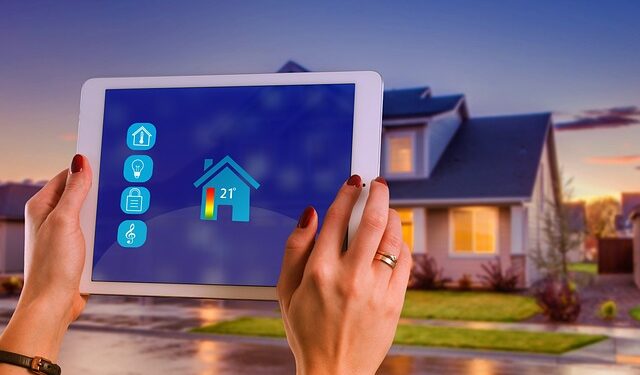Automation will enable businesses to expand while also meeting societal challenges more efficiently, but many industries remain uncertain of its potential impacts on their business models.
Smart homes are homes that use technologies and devices that can be remotely managed from voice-activated control or smartphone/tablet app control to make all devices operable from one central hub. A smart home may be constructed from scratch or added onto existing properties.
What is Home Automation?
Home automation refers to the digitally managed control of appliances and features in your house online to enhance security, comfort, efficiency and energy savings. Home automation devices allow homeowners to monitor and manage their home remotely with smartphones; home automation companies provide cutting-edge solutions tailored to individual home needs.
Home automation devices that interact with smart home systems are known as “automation gadgets.” These gadgets include smart light bulbs, doorbells, locks, thermostats and security cameras – as well as various wireless connections like Wi-Fi – that connect them all back to one hub or server that controls all these gadgets in your home and communicates between sensors and actuators to automate it all.
Sensors detect changes in temperature, sunlight and motion and adjust settings based on your preferences. Controllers — computers, tablets or smartphones that send and receive commands — make home automation systems so powerful, while actuators activate when instructed by remote.
Home automation should be considered the next logical step for homeowners, providing convenience, enhanced security, and increased energy efficiency. Home automation systems also serve to monitor healthcare at home as well as help elderly people living independently.
Smart homes can help protect against burglary, property damage, trespassing and fires. In addition, these intelligent systems can alert homeowners of unexpected events like flooding or fire and notify neighbors as well as emergency services immediately. Their lights can even be set to automatically activate at night to illuminate your home while dissuading potential criminals from breaking in.
Opening a home automation company can be extremely profitable, since most of your revenue will come from selling products and services directly to individuals rather than through distributor networks. When starting up, it’s advisable to draft up a business plan early on and define your target market early as well as choose your legal structure (LLC or partnership) before diving in headfirst.
Why Do I Need a Home Automation Company?
Home automation companies provide an array of products and services designed to optimize living spaces. Their main benefits are convenience and security – you can control everything from door locks, lights, televisions and refrigerators all with just one device! A home automation system also helps save energy by turning off devices when they are no longer being used; alert you if someone comes knocking at the door (deterring burglars in this way).
Google, Apple, and Nest Labs are among the premier home automation companies. Apple offers HomeKit as a platform that connects various smart home devices like thermostats, light bulbs and security cameras; other smart home devices use Zigbee or Z-Wave communication protocols instead. Google provides cloud computing apps and hardware along with search engine services; their 2015 acquisition of Nest Labs marked their entry into home automation.
Selecting an ideal business structure is key to building a thriving home automation company. Your options for formation may include sole proprietorship, partnership, limited liability company (LLC) or corporation. Establishing legal entities protect your assets in case you’re sued while keeping meticulous records makes filing taxes simpler.
Once your business entity is set up, the next step should be obtaining any necessary licenses or permits. You can find information regarding business licensing requirements by consulting the Small Business Administration’s reference to state licenses and permits. In addition to licensing requirements, business insurance provides protection in case of accidents or losses and should be purchased before opening for business.
Hiring a professional to install and use home automation systems is often the best solution, ensuring proper installation and use. They will be able to compare features and costs across systems, helping you select products that will best meet your lifestyle and budget, as well as creating plans tailored specifically for you.
What Are the Benefits of a Home Automation System?
Home automation systems make life simpler by allowing homeowners to control various devices through voice activation or apps on their smartphones, providing security and energy efficiency benefits at once.
Many devices feature built-in sensors to monitor changes in light or temperature and adjust settings accordingly, saving energy costs while freeing owners up from manually adjusting lights or appliances themselves. Some even detect water leaks and shut off automatically to help avoid damage and reduce repair bills.
Smart lighting, security and entertainment features can all be controlled remotely via smart phones or other electronic devices, providing homeowners with greater control of utility costs while helping keep kids from leaving lights or appliances on unintentionally or forgetting to lock doors or switch off air conditioning before leaving for extended periods. This feature is particularly handy if they have young ones that tend to leave lights on unintentionally or forget to turn off air conditioning when leaving their house for longer.
Home automation offers numerous safety benefits, including fire and carbon monoxide detectors that could save lives. Other devices included as part of an automated home system may include water flow sensors that could switch off appliances if left on, as well as usage monitors which reduce bills while alerting homeowners of potential issues.
Home automation systems also offer another key advantage in terms of expense tracking: being able to record expenses and income. This data can be useful when filing taxes or business documents, and can show owners where their money is going – essential if expanding your business or hiring more employees down the line. Additionally, home automation systems offer peace of mind to their owners by keeping records that enable tracking expenses and income over time. This feature of home automation makes an additional contribution towards managing budgets effectively as well as helping manage borrowing funds if necessary in future.
How Can a Home Automation Company Help Me?
Home automation companies aim to add computer intelligence into all aspects of everyday life, from keyless door locks opened with fingerprint scanners to toilets that flush and clean themselves. Home automation companies also provide showers that remember your preferred water temperature and flow rates; climate-control systems that monitor room humidity levels; climate-controlled lighting that responds to voice command; as well as internet-connected light bulbs which brighten or dim at your voice-activated request.
No matter if your home automation devices consist of single-task gadgets or multi-task automators, having automated tasks run for you is unparalleled. Imagine leaving work and upon entering a certain distance of home, your thermostat shifts from energy saving 82 degrees to more comfortable 68 degrees while lights come on automatically and blinds pull back automatically with music playing softly in the background; home automation companies offer this kind of advanced tech.
Start-up capital for home automation companies can include initial costs such as business setup costs, insurance, website development costs, marketing campaigns, initial equipment inventory needs and essential professional tools as well as office rent. Crowdfunding platforms are an effective way to raise money for new ventures like this one.
If you’re planning to purchase and install home automation systems, buying equipment from wholesale suppliers with established distribution networks is your best bet to finding great deals and having more options at your fingertips. This way you’ll have more affordable deals while being provided more flexibility.
Home automation services offer another solution, often customized specifically to you and offering customized solutions at an extra cost; however, their team of professional installers can take care of installation on your behalf.
As well as offering direct installations, some home automation companies also provide maintenance and repair of existing systems – this service can be especially helpful for older homes which may not be compatible with more recent home automation solutions.
Home automation may not be suitable for everyone; some homeowners may struggle with its cost, reliability and security of technology; however for most consumers investing in home automation can provide greater convenience than expected.









